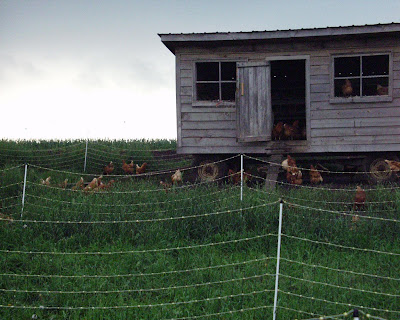
Laying hens recover from the heat. Half the farm's flock was lost to last week's extreme heat.
A bit of a disaster struck the farm this past week. We were braced for the heat—making sure our generator was set up in case of a black or brown out. Without electricity we’d lose produce in our walk-in cooler and fall plantings that we’ve started in our greenhouse, because they need frequent watering (and thus a functioning water pump). Fortunately, we never lost our power. Unfortunately, instead, we lost half our flock of laying hens. With the first hot night, we lost 15. The next hot night, another 11, and so the week continued. Sunday night, when the heat finally broke, we finally didn’t experience any losses. This is a first for the farm. We’ve lost hens to predators and had mature meat birds die from overheating (their breed is prone to heart failure under extreme heat), but we’ve never lost our laying hens in the heat. They’re usually a hearty lot.
Typically, it has helped that at night our hens roost in mobile hen houses—houses built on wheels. The floors are constructed of sturdy wire mesh so that the houses normally get a good bit of air flow, even when the doors shut at night from underneath. We construct them this way so that their manure doesn’t accumulate on the floor but falls onto the ground a few feet below them. This means their houses stay cleaner, the soil below gets some terrific, natural fertility, and they get good air. But this week’s heat was so relentless that we ended up putting baby gates in the hen house doors at night (to let more air in but keep predators out), and we ran extension cords from the barn into the field to run fans in each house through the night. We provided added shade in the field during the day, and hosed down their houses to cool things down too. But it wasn’t until we simply got a normal, reasonably cool night with a breeze (Sunday) that we stopped losing the birds.
So what does this mean for your egg share? At this moment, we’re trying to gauge how this is going to affect members’ egg shares in the long term. We have enough eggs for everyone this week. And it may be we’ll have enough for the coming weeks—and just none for our farmers’ market customers. It’s hard to tell right now, because the hens that held up through the heat aren’t laying at their normal rate. When chickens are stressed, they’ll stop laying eggs. We should have a better sense for how this affects our egg production by next week’s distribution and will keep everyone posted.
Meantime, while hens were dropping in the heat, our field crew was putting in 11-hour days in order to get their usual work done as well as bring in our largest garlic harvest ever. Our crew is a determined-to-work bunch. They don’t like to take days off, and they passed on the option of taking extra long lunch breaks so they aren’t working in the height of the heat. Thanks to their determination, the garlic came in on time (too long in the soil and it starts to break), and the hot, dry breezes we’ve had helps to cure or dry the crop as it hangs in the barn.
IN THIS WEEK'S SHARE:
1 cabbage
1 head of garlic
Fennel (1 large or 2 small that have been bunched)
6 1/3 ounces salad mix
3/4 pound (12 ounces) green beans
1 bunch carrots
2 fresh red onions (mild and wonderfully sweet when cooked or grilled)
On Fennel- You can do just about anything with fennel—grill it, roast it, sauté it, or, one of the farm’s favorites, eat it raw in a salad. For the latter, you’ll want to very thinly slice it or the texture can be a bit too coarse. You don’t have to have a super-sharp knife and knife skills to achieve this. A vegetable peeler lets you shave it. Trim the base, quarter lengthwise, cut out the core, and run the peeler lengthwise along each quarter to shave. You can also use a mandoline or hand slicer, if you have one. We stumbled upon this recipe for Quinoa, Nectarine and Fennel Salad on Sproutedkitchen.com. We especially liked that it used nectarines, which are in this week’s fruit share.
Cabbage: Don’t feel like you have to use your large head of cabbage overnight. This vegetable will hold in your crisper for at least a couple of weeks. While coleslaw is a refreshing way to eat cabbage raw, there are other ways to use raw cabbage, such as in a fish taco or, one of our favorite sandwiches, a reuben. Here’s an update on the reuben by a good friend, Tony Rosenfeld. He uses smoked turkey and a sun-dried tomato mayo instead of Thousand Island dressing: http://www.finecooking.com/recipes/smoked-turkey-reubens.aspx

No comments:
Post a Comment